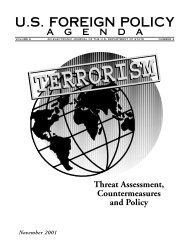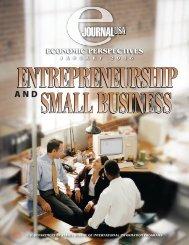s. history us history us history - Embassy of the United States
s. history us history us history - Embassy of the United States
s. history us history us history - Embassy of the United States
- No tags were found...
Create successful ePaper yourself
Turn your PDF publications into a flip-book with our unique Google optimized e-Paper software.
CHAPTER 15: BRIDGE TO THE 21ST CENTURYOUTLINE OF U.S. HISTORYAmericans were more inclined toenjoy <strong>the</strong> ride while it lasted than toplan for a coming b<strong>us</strong>t.THE ELECTION OF 1996 ANDTHE POLITICAL AFTERMATHPresident Clinton undertook hiscampaign for re-election in 1996under <strong>the</strong> most favorable <strong>of</strong> circumstances.If not an imposing personalityin <strong>the</strong> manner <strong>of</strong> a Roosevelt,he was a natural campaigner, whommany felt had an infectio<strong>us</strong> charm.He presided over a growing economicrecovery. He had positionedhimself on <strong>the</strong> political spectrum ina way that made him appear a man<strong>of</strong> <strong>the</strong> center leaning left. His Republicanopponent, Senator Robert Dole<strong>of</strong> Kansas, Republican leader in <strong>the</strong>upper ho<strong>us</strong>e, was a formidable legislatorbut less successful as a presidentialcandidate.Clinton, promising to “build abridge to <strong>the</strong> 21st century,” easilydefeated Dole in a three-party race,49.2 percent to 40.7 percent, with8.4 percent to Ross Perot. He th<strong>us</strong>became <strong>the</strong> second American presidentto win two consecutive electionswith less than a majority <strong>of</strong> <strong>the</strong>total vote. (The o<strong>the</strong>r was WoodrowWilson in 1912 and 1916.) The Republicans,however, retained control<strong>of</strong> both <strong>the</strong> Ho<strong>us</strong>e <strong>of</strong> Representativesand <strong>the</strong> Senate.Clinton never stated much <strong>of</strong>a domestic program for his secondterm. The highlight <strong>of</strong> its firstyear was an accord with Congressdesigned to balance <strong>the</strong> budget,fur<strong>the</strong>r reinforcing <strong>the</strong> president’sstanding as a fiscally responsiblemoderate liberal.In 1998, American politics entereda period <strong>of</strong> turmoil with <strong>the</strong>revelation that Clinton had carriedon an affair inside <strong>the</strong> WhiteHo<strong>us</strong>e with a young intern. At first<strong>the</strong> president denied this, telling <strong>the</strong>American people: “I did not havesexual relations with that woman.”The president had faced similarcharges in <strong>the</strong> past. In a sexual harassmentlawsuit filed by a womanhe had known in Arkansas, Clintondenied under oath <strong>the</strong> White Ho<strong>us</strong>eaffair. This fit most Americans’ definition<strong>of</strong> perjury. In October 1998,<strong>the</strong> Ho<strong>us</strong>e <strong>of</strong> Representatives beganimpeachment hearings, foc<strong>us</strong>ing oncharges <strong>of</strong> perjury and obstruction<strong>of</strong> j<strong>us</strong>tice.Whatever <strong>the</strong> merits <strong>of</strong> that approach,a majority <strong>of</strong> Americansseemed to view <strong>the</strong> matter as a privateone to be sorted out with one’sfamily, a significant shift in publicattitude. Also significantly, HillaryClinton continued to support herh<strong>us</strong>band. It surely helped also that<strong>the</strong> times were good. In <strong>the</strong> midst<strong>of</strong> <strong>the</strong> Ho<strong>us</strong>e impeachment debate,<strong>the</strong> president announced <strong>the</strong> largestbudget surpl<strong>us</strong> in 30 years. Publicopinion polls showed Clinton’s approvalrating to be <strong>the</strong> highest <strong>of</strong> hissix years in <strong>of</strong>fice.That November, <strong>the</strong> Republicanstook fur<strong>the</strong>r losses in <strong>the</strong> midtermcongressional elections, cutting<strong>the</strong>ir majorities to razor-thin margins.Ho<strong>us</strong>e Speaker Newt Gingrichresigned, and <strong>the</strong> party attemptedto develop a less strident image.Never<strong>the</strong>less, in December <strong>the</strong>Ho<strong>us</strong>e voted <strong>the</strong> first impeachmentresolution against a sitting presidentsince Andrew Johnson (1868),<strong>the</strong>reby handing <strong>the</strong> case to <strong>the</strong>Senate for a trial.Clinton’s impeachment trial,presided over by <strong>the</strong> Chief J<strong>us</strong>tice<strong>of</strong> <strong>the</strong> <strong>United</strong> <strong>States</strong>, held littles<strong>us</strong>pense. In <strong>the</strong> midst <strong>of</strong> it, <strong>the</strong>president delivered his annual State<strong>of</strong> <strong>the</strong> Union address to Congress.He never testified, and no serio<strong>us</strong>observer expected that any <strong>of</strong> <strong>the</strong>several charges against him wouldwin <strong>the</strong> two-thirds vote requiredfor removal from <strong>of</strong>fice. In <strong>the</strong> end,none got even a simple majority. OnFebruary 12, 1999, Clinton was acquitted<strong>of</strong> all charges.AMERICAN FOREIGNRELATIONS IN THECLINTON YEARSBill Clinton did not expect to bea president who emphasized foreignpolicy. However, like his immediatepredecessors, he quickly discoveredthat all international crises seemedto take a road that led throughWashington.He had to deal with <strong>the</strong> messyaftermath <strong>of</strong> <strong>the</strong> 1991 Gulf War.Having failed to depose SaddamH<strong>us</strong>sein, <strong>the</strong> <strong>United</strong> <strong>States</strong>, backedby Britain, attempted to containhim. A <strong>United</strong> Nations-administeredeconomic sanctions regime,designed to allow Iraq to sell enoughoil to meet humanitarian needs,proved relatively ineffective. Saddamfunneled much <strong>of</strong> <strong>the</strong> proceedsto himself, leaving large masses <strong>of</strong>his people in misery. Military “n<strong>of</strong>lyzones,” imposed to prevent <strong>the</strong>Iraqi government from deploying itsair power against rebellio<strong>us</strong> Kurds in<strong>the</strong> north and Shiites in <strong>the</strong> south,required constant U.S. and Britishair patrols, which regularly fended<strong>of</strong>f anti-aircraft missiles.The <strong>United</strong> <strong>States</strong> also provided<strong>the</strong> main backing for U.N. weaponsinspection teams, whose missionwas to ferret out Iraq’s chemical,biological, and nuclear programs,verify <strong>the</strong> destruction <strong>of</strong> existingweapons <strong>of</strong> mass destruction,and suppress ongoing programs tomanufacture <strong>the</strong>m. Increasinglyobstructed, <strong>the</strong> U.N. inspectorswere finally expelled in 1998. Onthis, as well as earlier occasions<strong>of</strong> provocation, <strong>the</strong> <strong>United</strong> <strong>States</strong>responded with limited missilestrikes. Saddam, Secretary <strong>of</strong> StateMadeline Albright declared, wasstill “in his box.”The seemingly endless Israeli-Palestinian dispute inevitably engaged<strong>the</strong> administration, althoughnei<strong>the</strong>r President Clinton nor formerPresident B<strong>us</strong>h had much to do with<strong>the</strong> Oslo agreement <strong>of</strong> 1993, whichestablished a Palestinian “authority”to govern <strong>the</strong> Palestinian populationwithin <strong>the</strong> West Bank and <strong>the</strong> GazaStrip and obtained Palestinian recognition<strong>of</strong> Israel’s right to exist.As with so many past MiddleEastern agreements in principle,328329












